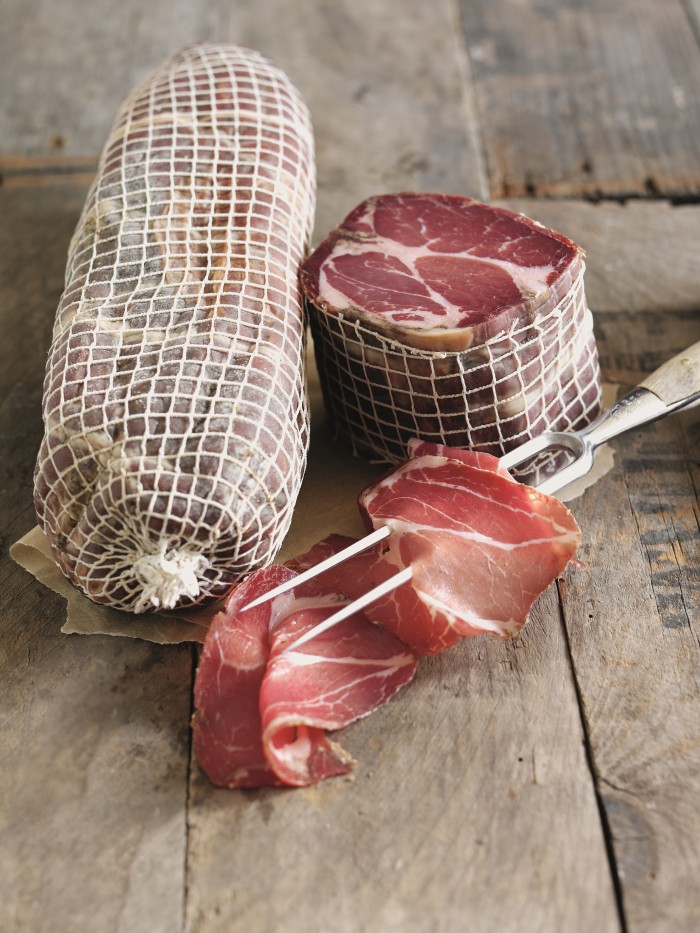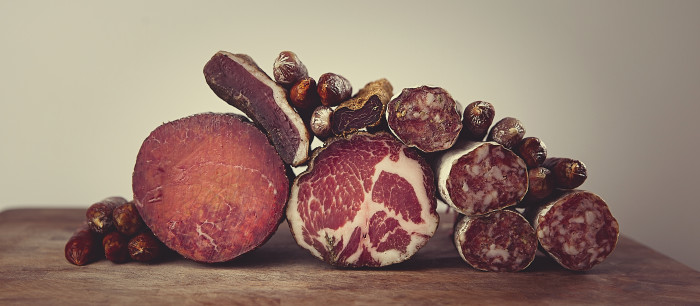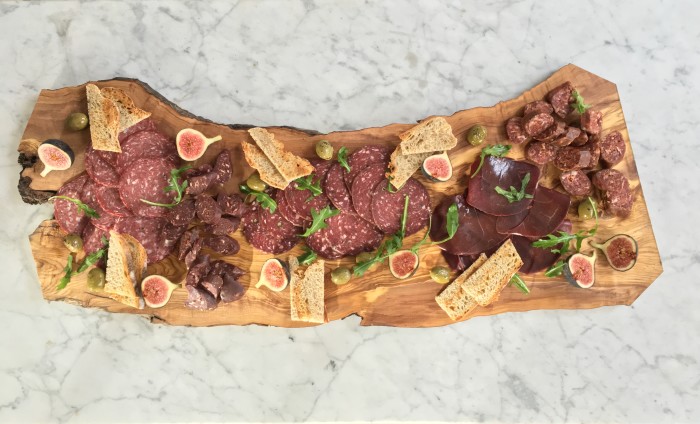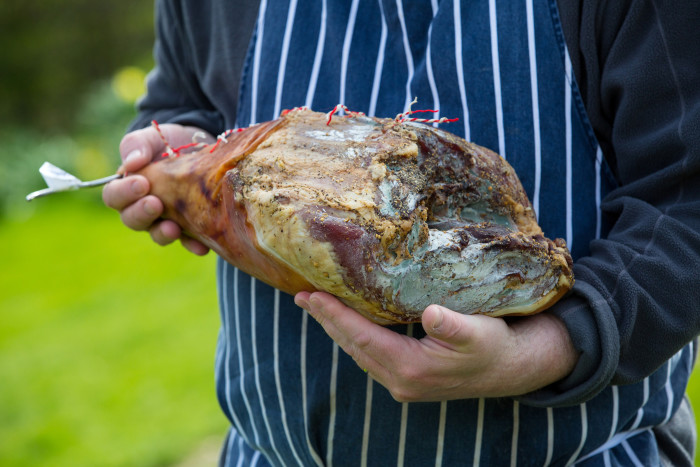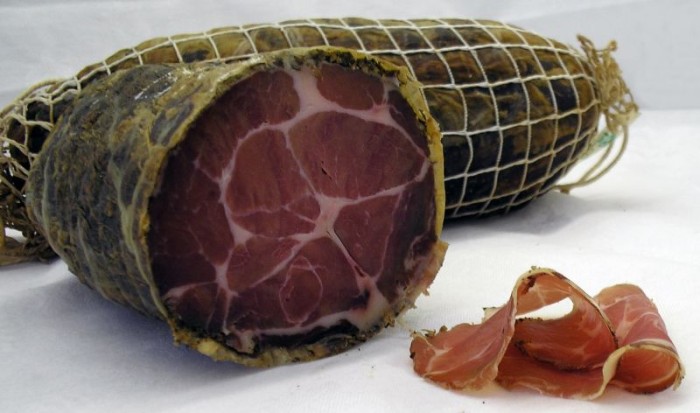Charcuterie In The U.K.
Back in 2015, there was a commercial for Google Translate that was making the rounds on British television in which a French woman at a dinner party approaches an English guy, who is hovering over the a pot of stew on the stovetop. She asks what's for dinner, and they engage in an irritating debate on the nomenclature for said stew (he says "beef stew," she smugly fires back "ragoût de boeuf"), a communication hiccup that can, lo and behold, easily be solved by said Google app. They go on to have a tepid romance, an app saves the day, and all is well with the world again.
You would think that Britain, with its proximity to neighbors France and Italy, would have a much better national cuisine than its international reputation suggests. The fact that we Brits share plenty of equivalent dishes with our Gallic neighbors (beef Wellington/boeuf en croute, roast chicken/poulet rôti and so on) suggests that similar solutions were found when presented with remarkably similar ingredients and resources.
But while Spain and Italy boast hams of Biblical repute and even France and Germany have their Bayonnes and Black Forests, what about the poor old U.K.? "Britain's had a big history of cured meats — some dry cure — but never a history of dry cured meats that were ready to eat," says James Swift, charcutier and owner of Trealy Farm in Monmouthshire. "So in Britain you would cure bacon or hams, and sometimes you would air-dry them for a very long time and cure them in a lot of different spices. But you would never slice them and eat them," he says.
The climate is a huge factor in this. While in Europe, weather systems are very settled, the notoriously fickle British weather has a huge effect in determining the final product. "We have to control every step of the process," Swift explains. "They know when it's going to be very dry and when it's going to be very wet — we don't. And humidity is a disaster for air-dried products, so we have to regulate it."
But since the first pioneers, like Swift and British charcuterie staples Deli Farm, took the initial steps of experimenting with producing salamis and cured hams in Britain's temperamental climate, there has since been an explosion in small businesses producing and selling world-class dried and cured pork products to make a devotee to the cause weep with joy. Who are these producers? And what delicious things are being produced? Read on, dear reader, and see how a curious mind and a little experimentation can make up for the lack of a stable climate.
Trealy Farm
Swift founded Trealy Farm with his wife, Ruth, after the two left their government jobs in London to escape to the rural idyll of Southeast Wales, located approximately halfway between their childhood homes. Since experimenting with the first of the farm's products, the business has gone from strength to strength, scooping up numerous awards and accolades along the way.
While their air-dried salamis are a staple of their farm, they also produce an array of stunning whole meats from their drove of Saddleback, Gloucestershire Old Spots and Hungarian Mangalitsas, including air-dried pork collar and ham air-dried and smoked with local Monmouthshire beech. Notably, the farm sells a lot of pig cheeks, both as guanciale but also in the form of Bath chaps, a regional British specialty from the Bristol and Bath region, formed from the lower half of a pig's cheek.
What of the old wives' tale that suggests the Romans stole the recipe for air-dried ham from Wales and returned to create their prosciuttos and salamis? "The one country in the world that isn't suitable for air-drying meat is Wales," Swift says. "Variable climate, wet climate; none of the right cultures naturally occur in the air. When you compare it to somewhere like Tuscany where all you have to do is stick a ham outside at the right time of year and everything happens by itself because you have the perfect climate, the perfect humidity, the perfect cultures in the air — I've heard the story as well," he laughs, "but I don't believe it." trealyfarm.com
Rutland Charcuterie
Originally trained as a cabinet maker, Nick Brake launched Rutland Charcuterie in 2014 after five years running top-end chalets in the French Alps and being able to indulge a love of charcuterie, loading up the car every time he and his family returned home to Nottingham after each season.
"I became increasingly frustrated that British charcuterie was not more readily available in this country, despite the U.K. having the best livestock in the world," he says. "We now specialize in making British salamis and air-dried meats, using the best locally sourced free-range meats to give us the best-tasting products." He sought the help of master butcher Rich Summers, who also imparted a passion for involvement and accountability at each step of the process.
Describing Rutland's products as salamis and air-dried meats is accurate, if somewhat of an understatement: The coppa and bresaola, cured and then air-dried, pack serious flavor, and the duck prosciutto is as wonderfully fatty and salty as you would imagine. The belle of the ball, though, is perhaps a perfect noix de jambon, created from a pig's smaller leg muscles, dry cured, coated in spices, netted and hung to air-dry at the farm in rural Leicestershire.
"There is a growing demand for the highest-quality British charcuterie from discerning retailers and consumers," Brake explains. "We really want to continue to build on the success of British charcuterie, and I'm looking forward to the day when we can start exporting it back into the Mediterranean." rutlandcharcuterie.co.uk
Great Glen Charcuterie
You'd have a wealth of reasons to plump for venison for your protein fix — low in fat, high in vitamins and so on — but really, nothing's quite as visceral as sinking your teeth into a slab of wild deer. Great Glen Charcuterie takes this up a notch, using its farm in the rugged Scottish Highlands as a base for sourcing wild venison from the surrounding glens and woods and turning them into delicious, unique salamis, chorizos and air-dried meats like bresaola.
The owners, Dutch expats Jan Jacob and Anja Baak, established the farm as a family business after moving to Scotland in 2000, and moved from full-time deer processing to specialized charcuterie production with their six children. The deer roam freely in the hills, grazing on heather, wild plants and grass, though this idyllic scenario wasn't what got Baak and Jacob started originally.
"We started with venison as this was what we came across when working on a Scottish estate," says Baak. "The deer was culled as part of management to control [their] numbers as there are no natural predators left in Scotland. Back in 2002, gamekeepers didn't get much money for the culled deer as there wasn't much of a demand, which spurred my husband, Jan, to add value to the product to extend the shelf life so we could find a better market."
Unlike larger operations in Europe, the company is the epitome of family-run, continuing to operate from an old butcher shop in the village of Roy Bridge in the remote Highlands. Meanwhile, the production, packaging of orders and tasting fall to the family's children, with the elder siblings selling the product at local farmers' markets and food festivals. greatglencharcuterie.com
Chiltern Charcuterie
Like many others in Britain's fledgling charcuterie trade, Catherine Miller and Ross Smethurst didn't originally start in the cured-meat industry — they started as two keen amateur cooks who started making bresaola at a friend's suggestion. "The practice of preserving meats is almost as old as mankind," declare the pair, who launched Chiltern Charcuterie in the summer of 2014. "While recorded recipes date back more than 4,000 years, the fundamental methods were likely used in the earliest civilizations."
They've used that historical savvy to good effect, making a Roman-era cured lamb — known as "sagi" — that's been air-dried and hung for a minimum of six weeks to concentrate and intensify the flavor of the meat, which is given a boost with natural accompaniments like garlic, rosemary, thyme, juniper berries and salt. They've also modernized the process by using rare-breed animals from Chiltern Lamb in Oxfordshire.
"The Romans were first to regulate meat preservation, but it was the fifteenth-century French charcutier that transformed the practice into a form of culinary art," they say. Besides some enviable beef and pork salamis, chorizos and pancetta, the team also source wild venison from the lush Hughenden Valley in Buckinghamshire, which is then marinated in sloe gin for four days before being cured with coriander and black pepper to produce ethereally delicate meat, with the subtlest tinge of spice. chilterncharcuterie.co.uk
Deli Farm
If you believe the blurb on Deli Farm's website, the site is mentioned as far back as the Doomsday records — even preceding the use of the word "deli" as an abbreviation for delicatessen. Since it's older than language itself, it isn't a surprise to anyone that the air-dried salamis and hams being produced here are among the country's best, having won innumerable awards since opening up shop in, er, 2006.
Like Trealy, Deli Farm is adored by both critics and their fervent customers, and it has supplied everything from high-end London restaurants and delis to Wimbledon (the tennis event, not the town) and the 2012 Olympic Games (a reported ton of chorizo was delivered to the athletes' village in Stratford, East London). However, the windswept hills that they call home — between the rugged north Cornish coast and romanticized moors to the south — is antithetical to such starry association, as are partners Martin and Jean Edwards's techniques.
"In the latter months of 2005, we spent a lot of time researching techniques and equipment," Jean Edwards explains. "Our very first experimental batch of salami was made using an old smoker for a fermentation chamber, cobbled together with a CPU fan and a light bulb, and an old domestic fridge for an air-drying room where Martin altered the workings to get it running warm, instead of cold." She laughs: "How times have changed!"
Modern food science is a valuable essence in regulating the unpredictable variables of the Cornish climate (pH, Aw testing and organoleptic checks are all standard), but time-honored techniques are at the heart of the process: prime cuts from selected producers, many within a 20-mile radius, are mixed with freshly ground herbs and spices before being carefully poured into natural casings. They're then hung up and left to slowly dry. As well as a legendary coppa, Deli Farm also produced excellent duck prosciutto and a luxurious smoked lamb prosciutto.
"With all air-dried products, what you put in is what you get out," says Edwards. "There's no cooking involved to tenderize sinew, which is why with a lot of the cheaper salami, you end up with a mouthful of chewy bits," thus only hand-trimmed pork leg is used in all of Deli Farm's salamis. "It does make it more expensive but gives it a far superior texture — we're not prepared to sacrifice quality for cost." delifarmcharcuterie.co.uk


